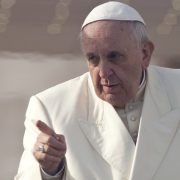Is The Pope Totalitarian? He Certainly Prefers Central Control Over Free Markets.
Do you handle money? Better be careful. It’s the “dung of the devil”, according to the Pope, as reported in the Wall Street Journal. This somewhat emotional feeling about, and imprecise understanding of, finance and markets leads him down a path of condemnation of capitalism. His disgust is captured in a document recently released by Vatican offices and personally approved by the Pope.
The Pope’s solution to the problems identified in the document include totalitarian central control at the global level, and the banning of any innovative financial instruments of which the Pope does not approve. Some examples:
Elimination Of Markets.
The Pope is no fan of F. A. Hayek. Markets, he declares, are not capable of governing themselves. Lack of governance, according to the Pope, gives free rein to fraud and other negative effects including environmental damage. The love of money leads to global warming, apparently, as well as a lot of additional excesses that he finds distasteful. He has an answer.
Global Central Control.
Even nation states are insufficiently controlling for the Pope’s preferences. “The supranational dimension of the economic system makes it easy to bypass the regulations established by individual countries”, according to the Vatican document. The perfectly logical answer, in that case, is global control. In earlier declarations, the Vatican has expressed its favor for a “global public authority” and a “central world bank” to regulate the international financial system. This time, their wording is:
“The current globalization of the financial system requires a stable, clear and effective coordination among various national regulatory authorities.”
Since the Vatican is a globally centralized organization that seeks to control how individuals think and behave in religious and social matters, it is natural that they should assert the same principles for free market exchanges between individuals and firms. To misquote Henry II, “Who will rid us of these meddlesome priests?”
Don’t Try To Reduce Your Tax Rate.
One of his reasons for preferring global control to nation-state level control is because the nation states are free to compete among themselves to offer more hospitable tax regimes to interested consumers. He condemns “offshore tax havens” as places to recycle dirty money associated with the mafia and war booties. Your thought you were just seeking alternatives to the egregious levels of extraction you face in your home country. But no, you just became a member of a murderous criminal organization. Better take confession.
Product-level Micromanagement.
The Pope is not satisfied with globally centralized control at the level of rules and regulations. He has his own point of view about specific financial products that have been invented by creative innovators in financial markets and adopted by customers because they meet identifiable needs and solve specific problems.
He dislikes debt securitization, saying that the risky nature of such products makes them a “ticking time bomb ready sooner or later to explode.” Clearly, he has not asked himself the first question in the entrepreneur’s handbook: “What do I know?”
He also expresses disdain for credit default swaps. He characterizes them as “gambling on the failure of others, which is unacceptable from an ethical point of view…a kind of economic cannibalism.” It is to be wondered how he feels about insurance, which is not only betting on the failure of others, but of oneself to keep one’s automobile out of the ditch and one’s life out of terminal accidents.
No Limit To The Scope Of The Control Community.
The word “catholic” means universal. That is the targeted span of the central control community, in which we can include not only the Catholic Church, but also the World Bank, IMF, United Nations, EU and many, many more institutions that recognize no bounds. They share thinking with global communism and all the totalitarian themes in history.




